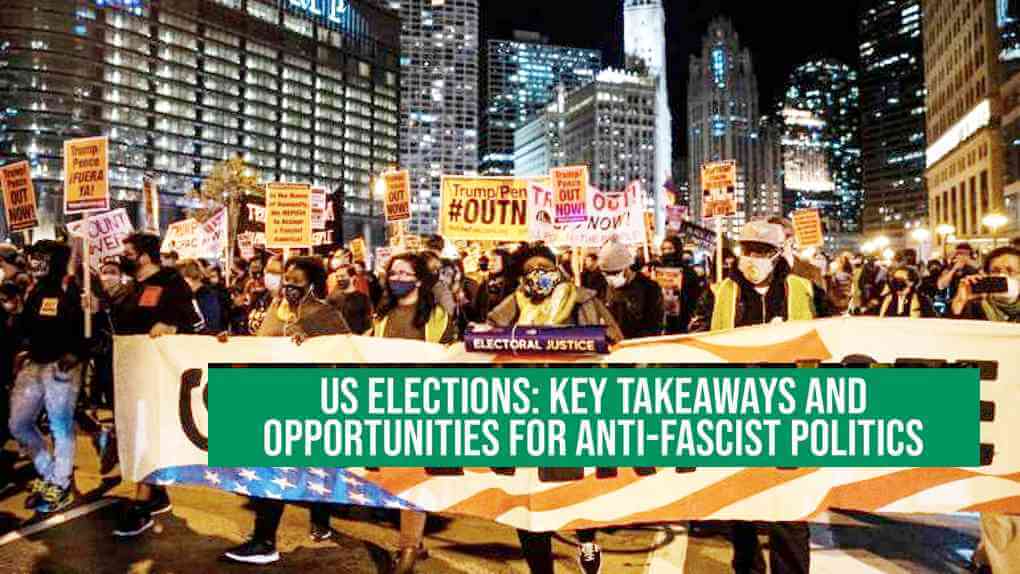Donald Trump, whose rise to the Presidential office began with the (infamous) racist “birther” campaign falsely alleging that Barack Obama wasn’t born in the US, has spent the better part of the last few years poisoning political discourse in the US with rampant misogyny, open race baiting, Islamophobia and xenophobia. He has preyed on the worst, most vile instincts inherent in the US, amplifying and encouraging prejudices, hatred and insecurities from the biggest bully pulpit available in the US. Also crucial to note is the fact that Trump has over the years effectively gained complete control over the Republican Party (GOP). He has held Republican Senators and senior leaders of the party in a vice-like political grip, getting them to obsequiously pander to his lies and his dangerous efforts to bend and misuse institutional power. This apart, the Trump regime has been waging a relentless war against the environment and against public healthcare and education. The last four years, in fact, had showcased the extent of fragility of democracy in the US, and the potential of fascist cultural narratives overwhelming democratic norms.
The Results: Trump OUT, Trumpism to Stay
While the results are yet to be officially certified (a process that normally takes some months), the outcome is clear. Donald Trump has lost, defeated by the Democrat Joe Biden. Biden is slated to win 306 Electoral Votes (he needs just 270 to win the Presidency). Not just has Biden won the popular vote by a margin of 3.6% over Trump, he has received the highest number of votes (more than 79 million) any candidate has got in American history. It is not easy to displace an incumbent President seeking reelection in the US, making Biden’s victory much more special. Besides easily defending states that have traditionally been Democrat strongholds, Biden managed to win back several states that Hillary Clinton lost narrowly in 2016. This includes the so-called ‘Rust Belt’ – the industrial centres of Michigan, Wisconsin and Pennsylvania. Biden won handsomely in cities of Detroit, Milwaukee, Philadelphia and Pittsburg in the Rust Belt. More damning, however, for the Republicans was Biden’s ability to perform exceptionally well in the suburban areas surrounding these cities, precisely because suburbs such has these had catapulted Trump into power four years back. These defeats apart, the death knell for the Trump reelection campaign was Biden’s victory in the traditional Republican strongholds of Arizona and Georgia. Even popular Democrat candidates such as Obama hadn’t managed to win in these states, known to be socially conservative.
To add to this victory is the fact that Kamala Harris is now the Vice President elect of the US. She will be the first woman to be elected to such a major post in the US. Her origins make her victory all the more special. Born to an Indian woman and a Jamaican father, she is a strong symbol of America’s multicultural ethos – an ethos which has been an unsettling and irritating thorn for Republicans. It comes as no surprise that Harris received more than a usual share of attention that a Vice presidential candidate gets during the campaign. While most Democrats faced accusations of being “dangerously liberal”, “socialist” and anti-America, Trump and other Republicans repeatedly subjected Harris to sexist and racist barbs. Trump told exultant crowds at his rallies that they should not let her become the first woman President at any point; her laugh was mocked by Trump (“something wrong with her”, he said commenting on her laugh); her name was arrogantly mispronounced (“Kamala-mala-mala. I don’t know. Whatever”, said a Republican Senator); and she was referred to as “nasty” and a “monster”. Harris’s victory at a time when race relations in the US are particularly fraught, and when we are seeing a strong patriarchal pushback against ideas of gender justice and equality is surely an important moment. Republicans have relentlessly weaponized cultural wars and race hysteria, aiming to warn the Democrats that socially conservative America will never accept serious challenges to social fractures of race and gender. Kamala Harris is a defiant response to this Republican narrative.
It is important, nevertheless, to recognize that this election wasn’t a thorough repudiation of Trump and Trumpism. Trump received more than 73 million votes – 10 million votes more than he received in 2016. He received a greater percentage of votes amongst key demographics – Black men, Latino men and white women in particular – than he did in 2016. He has received the second highest votes for a Presidential candidate in the US. The story does not end there. Republicans performed extremely well in the House and Senate races. They have taken back several House seats from the Democrats, coming extremely close to challenging the Democrats’ majority in the House of Representatives. Moreover, they have performed well in the Senate races too. As of now, the Republicans have 50 seats in the Senate and the Democrats have 48 (out of 100). The only chance the Democrats have to control the Senate is to win both the Senate runoff races in Georgia in early January. By all accounts, this will be an extremely difficult feat to pull off, and by the end of January, the Republicans would have retained their control over the powerful US Senate. The Republican candidates who won Senate seats are those who hitched their political wagon to Trump and Trumpism. In other words, they highlighted the fact that they were Trump’s favourites (unlike some Republicans who chose to distance themselves from some of Trump’s policies and rhetoric), and were rewarded handsomely by the electorate. None of this is good news for the Democrats and Progressives in the US. They have in front of them the looming specter of a Republican-controlled Senate which will dictate everything from policy to Cabinet appointments, and of a political narrative that will continue to be deeply influenced by Trump.
Why Removing Trump was So Important
This underscores how exceedingly difficult it was to defeat Trump, and what a concerted effort it has taken political and grassroots activists to chip away slowly at his popularity. This message needs to be conveyed emphatically to liberal and democratic voices across the world. Following Trump’s defeat, there has been some talk of how this means little in the long run. One face of US imperialism, one bully, has been replaced by another, we are being told. Nothing can be further from the truth. To begin with, a defeat of a fascist demagogue who thrives on racist and xenophobic dog whistles doubling as red meat for the adoring audience in his rallies is good news. One cannot serious contest the importance of defeating someone whose political agenda is to reaffirm white supremacy and to dismantle democratic institutions.
There is, in addition, a serious problem with equating a Trump administration with a Biden administration. While both surely would stand for US imperial interests across the globe, the fact is that a second Trump term would embolden right-wing, fascist, authoritarian, conservative forces across the world. Putin, Erdogan, Bolsonaro, Modi, Boris Johnson and others have thrived on the enthusiastic support they receive from the US administration. It is not only workers and indigenous movements who seek global solidarities; right-wing fascists also seek to build alliances in their quest for social, cultural and economic hegemony. For Indians battling RSS’s cultural nationalism and Islamophobic discourse, it helps not to have a loudspeaker in the White House amplifying poisonous rhetoric that will provide a validation of RSS’ cultural world.
As media organizations in the US announced that Biden would be the next President, lawyer and author Van Jones broke into tears on the CNN on Prime Time television. He spoke of what Trump’s defeat means for Muslims demonized on a routine basis by the White House, for immigrants who have their small children separated from them, for Black men and women who have over the past four years borne the brunt of a louder and shriller white supremacist narrative. Trump’s defeat matters, he emphasized. Alexandria Ocasio-Cortez (AOC) reinforced this point when asked why she, as a progressive, socialist Democrat was campaigning actively for Biden: “I don't think anyone can look me in the eye and say that they won’t be better off in a Biden administration, that they won’t be more protected under a Biden administration…we can make tactical votes”. Let us not forget that in Trump’s America, his supporters actually asked a Navajo Native American elected as a state representative if he was “here legally”; “Get out of the country”, he was told by a mocking and aggressive crowd in Arizona.
This is precisely why grassroots groups such as the Indigenous Environmental Network worked hard to mobilize against Trump. They provided the votes to send Trump packing from the White House and saw his defeat as a result of their collective power. This was their victory, they remind us, while also telling us that they will hold a future Biden administration accountable for safeguarding environmental rights and dignity of their communities. What do we learn from these voices emerging from the US? That removing Trump from office is an immediate and urgent priority. That their vote for Biden, far from being a free pass for him, would be followed by battles against his administration to ensure their rights. One cannot imagine a clearer and most unambiguous understanding of American politics.
Implications and Lessons from the US Elections
In the days to come, we will hear a lot about how the Biden campaign managed to unseat Trump. We need to point out one factor here, which is especially relevant to India. Democratic institutions in the US have not been dismantled or horrifically weakened the way they are in India. They are still in a position to provide some pushback to fascist narratives. The media in the US, for instance, has had a role to play in Trump’s defeat. Many channels have together provided continuous antidotes to Trump’s barrage of lies, half-truths, racism, sexism and political hypocrisy. Trump, as well as key GOP leaders, have had to face tough questions on all controversial decisions they have taken – ranging from the ban of immigrants from seven predominantly Muslim countries, to the Trump administration’s walking away from climate talks to most recently the GOP’s hasty moves in October this year to install a right-wing conservative judge in the Supreme Court. After the elections, these media outlets have ripped apart Trump’s attempts to claim that the election was somehow “rigged” and stolen away from him, by providing timely and point-to-point rebuttals to each of Trump’s lies. Unlike Modi, who has a media ecosystem lapping up his every word, Trump has had to deal with the media by calling them “fake news”. Even in the face of authoritarian onslaughts, various state bodies (such as those in charge of conducting elections) have also showcased degrees of autonomy and professionalism that we rarely see in India.
That being said, a lot more was required to defeat Trump in an atmosphere where he enjoys massive support from a committed mass base. Here is where the experience of grassroots groups needs to the located. These experiences supply important lessons for anti-fascist organizers everywhere, because they highlight the potential of hard, committed grassroots work. Bernie Sanders, who missed being nominated by the Democratic Party as their candidate twice in a row, ran an energetic campaign amongst voters who would prove crucial to a Democrat victory. He ran several virtual meetings in Kentucky, West Virginia, Iowa, Wisconsin, Colorado, Texas, Vermont, Pennsylvania and Michigan, focussing on Latino, rural and working class voters.
He campaigned specifically for strong action to address climate change, for a minimum wage for every working family, and for expansion of publicly funded healthcare and education. These issues, not really the focus of the Biden-Harris campaign, helped to mobilize key constituencies such as workers’ unions and youth. Sanders has long been supported by a growing group of young socialist leaders in the Democratic Party. The ‘Squad’, as Trump derisively called them, consisting of AOC, Ilhan Omar, Rashida Tlaib, Ayanna Pressley and others ran spirited campaigns on the ground. They mobilized and registered voters, ran door-to-door campaigns wherever possible, used their resources to run advertisements on social media and TV. The important message from the ‘Squad’ was that there is absolutely no short cut to establishing a deep connect with voters; listening to them, talking to them, working with them on their day-to-day problems throughout the year. “Embrace the Base” and embrace issues close to the base’s needs and aspirations was their message to the Democratic Party leadership, a party used to big bucks and mega campaigns but unused to running sustained campaigns throughout the year. After the election, Omar for instance released data on the number of people (running into several hundred thousands) that her campaign had personally contacted through text messages, phone calls and face-to-face meetings. This manner of campaigning and establishing a close connect politically insulated them from barbs of being “un-American’, too “dangerously socialist” and so on.
While the Squad was busy running intense campaigns, Black, Latino and Arab-American leaders in the Democratic Party had a slightly different challenge – the challenge of upturning systemic, decades long voter suppression of their communities aided and abetted by not just the Republicans but equally by local administrations. As Stacey Abrams realised after her close (and losing) battle to become the Governor of Georgia, something had to be done to address this systemic problem. Over the last two years, several grassroots groups have worked hard and quietly to register voters and to establish a long-term connect with them. These campaigns have been particularly effective amongst Black and Latino workers in Georgia and Arizona and even in the Rust Belt states of Pennsylvania, Michigan and Wisconsin. Several political commentators have noted that Black women organizers such as Abrams and LaTosha Brown crafted the Biden victory, by helping him win several crucial states. For the Democrats, the message was clear: regular campaigning was the key to success. This message was made even more clear given the lacklustre performance of the Democrats amongst Mexican Americans and Cuban Americans in Texas and Florida. Trump ran an aggressive campaign, portraying all Democrats as Castro-lovers and dangerous Communists. In the absence of an effective counter messaging by the Biden campaign, these communities voted overwhelmingly for Trump, easily delivering Texas and Florida to him.
Issues: CoVID and Livelihoods
A dominant theme running through several political commentaries about the US elections was that the CoVID pandemic played havoc with Trump’s re-election campaign. Had the pandemic not happened, we are told, Trump would have won. There is of course some merit to this argument. It goes without saying that Trump mismanaged the pandemic on an epic scale. He did almost everything that should not have been done. He claimed CoVID was a hoax, he claimed that it was just a flu, that it would disappear. He disparaged masks and people who wore them. He disagreed, rudely and publicly, with medical experts and the World Health Organization. He undermined his own coronavirus task force. In other words, he created a mess as a result of which one of the world’s most development countries with the best resources showcased one of the worst CoVID related statistics in the world. Deaths skyrocketed, with Republicans showing more keenness to launch culture wars around masks. Old white men, in particular have shown their disapproval of Trump’s handling of the virus by voting in large numbers for Biden.
However, the CoVID-related narrative was hardly a one-way street. To understand this, it would be instructive to borrow a story narrated by Aditya Chakrabarty in the Guardian (https://www.theguardian.com/commentisfree/2020/nov/12/donald-trump-poor-white-americans-despair-leader). Chakravarty introduces us to Mike Stout and his family in Pennsylvania. Mike Stout, a union leader one time employed in a steel plant, was happy to see Obama elected in 2009, excitedly watching Obama’s inaugural in 2009. As time elapsed, his job disappeared. His daughter, ekeing out a far more precarious living as employee in a hotel than her parents, lost her low-paying job this year during the pandemic. Hope dissipated for the Stout family, only to be replaced by a sense that the political class cares little for them. It is this kind of voter whom Trump appeals to. A person who is economically and socially insecure, raging against a system that does not seem to care. Trump’s CoVID messaging – a combination of denigrating science and masks – also included a message that did hit home for millions of working families. As he raged against lockdowns, he claimed, repeatedly, that the “solution should not be worse than the disease itself”. Trump therefore managed to convey that he is trying to save jobs, while the Democrats want to shut down the economy. For families anxious and worried about the falling economy and jobs fast disappearing, this was a message of hope. The CoVID-related narratives therefore probably helped both campaigns. The US elections have let us know, in so many ways, that livelihood, dignified jobs, decent wages and access to healthcare and education matter to them.
The Republican base of course needs assurance that American culture will continue to be dominated by the majority White population. They are keen to engage in the culture wars that the Republicans thrive in. “Law and order”, right to own guns, control of abortion rights, continue to enthuse them. However, these elections tell us that they too are keen to hear about jobs and livelihoods, about healthcare and education.
The Road Ahead in US Politics
Republicans today are hopelessly caught in Trumpism. There are calls, from within, to make the GOP the party of the “working class”, buoyed by voters they have identified in the Rust Belt and elsewhere. But this is a tough road for them to tread on, given the fundamental fissures within the party. It is far easier for the GOP to fashion itself as the voice of the ‘marginalised’ white, America, upset with growing multiculturalism as well as social, political, and cultural assertion of Blacks, Latinos, Muslims and other non-white minorities. For the Democrats, it is high time for them to reclaim the working class space from Trumpism. Several Democrat leaders have pointed out that the Party has to evolve a language to speak to disenchanted workers who feel that the Democrats have ditched them. It is time to make Mike Stout and his family believe in the Democrats once again. It is here that Sanders, AOC and the progressives in the Democratic Party have useful ideas and experiences to share. Only time will tell what path the US chooses to take in the days and years to come. Right now, of course, the country is busy dealing with a President who refuses to accept his loss and who is busy weaponizing his loss to rake in money for his political future.





